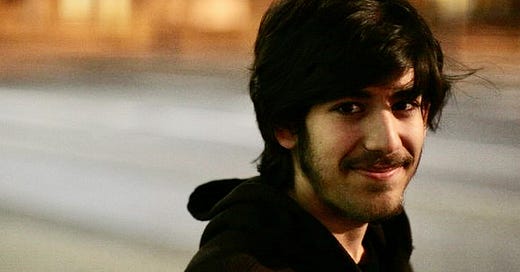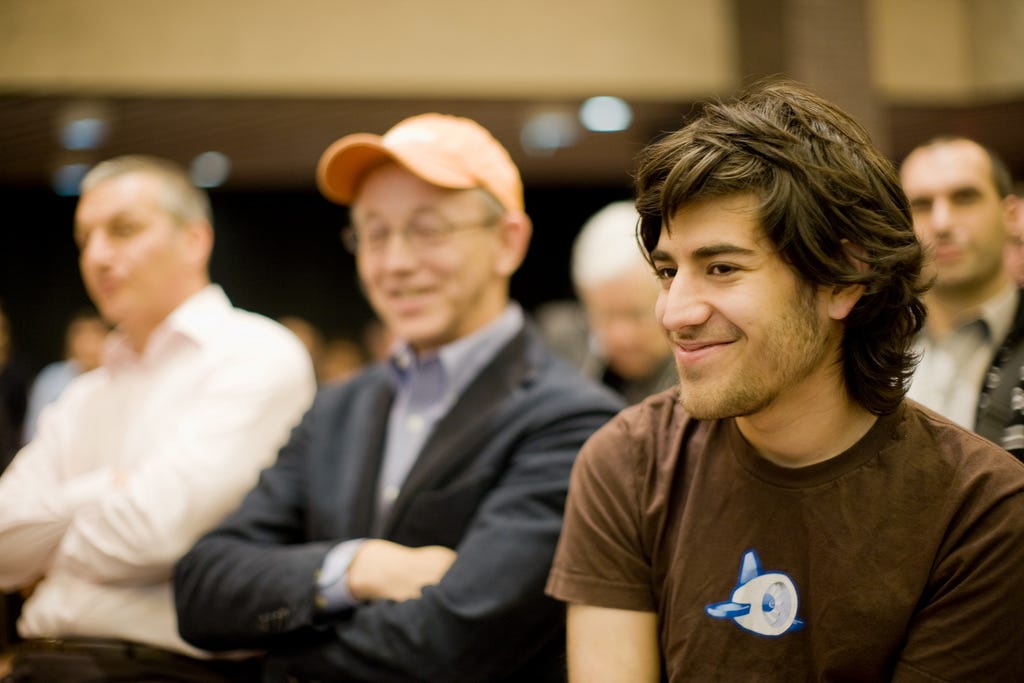Aaron Swartz, fighter for freedom
10 years ago today, the hacker and activist took his own life, but he lives on when we connect with his ideals and spirit
On the surface, the story of Aaron Swartz can only be viewed as a tragedy. One of the brightest minds of his generation, he was also one of the most tenacious idealists — he was constantly trying to do the most good possible, to find the leverage points where he could change the system. And he died far too early, at 26. The US government was trying to lock him up for the next 35 years of his life, and he couldn’t handle the pressure, so he committed suicide on January 11th, 2013. He had dedicated his life to freedom, to breaking down walls and unlocking locks, and he couldn’t handle the idea of being himself locked up for so long.
But his death need not only be a tragedy. He can live on in us if we make a home for his striving, for his fiery ideals, for his spirit.
“Aaron believed that you literally ought to be asking yourself, all the time, What is the most important thing I could be working on in the world right now? And if you’re not working on that, why aren’t you?” — Taren Stinebrickner-Kauffman
Aaron was driven by curiosity, a thirst for knowledge. He taught himself to read at 3 and never looked back. He then discovered computers and fell in love with programming and internet culture. In his teens he helped build some of the internet’s basic infrastructure — the first personalized news feed (RSS) and a simplified coding format that even amateurs can use (Markdown). When he was 14, he was one of the main architects behind Creative Commons, the online licensing format that gives creators power over how they share their work.
He then went to Stanford for a year but dropped out to co-found the company Reddit. That experience was the beginning and end of his start-up phase. The company was bought up by Condé Nast and Aaron couldn’t stand the ‘get rich quick’ culture of Silicon Valley, so he got himself fired.
“The way Aaron always saw it is that programming is magic. You can accomplish these things that normal humans can’t, by being able to program. So if you had magical powers, would you use them for good, or to make mountains of cash?” — Ben Swartz
A tale of two causes — fighting money in politics and liberating knowledge
In the years following his brief start-up phase, Aaron became much more deeply involved in activism, taking a role in countless campaigns, especially through the nonprofit he co-founded, Demand Progress. But he often came back to two main causes that he felt were the most important: the harmful effects of money on politics and the need to make knowledge accessible to everyone (what has been called the “open access” or “free culture” movement).
It was because of two actions that he took for these causes that the government first noticed, and then later arrested him.
The first action was connected to the inaccessibility of the law. The law is constantly evolving, being interpreted anew through the judicial process, and the resulting legal proceedings are meant to be open to the public. Everyone needs full access to the law because how else do you know if you’re breaking it?
But in the U.S., a private company called PACER controls access to legal proceedings. They run the country’s database of court cases and they charge a fee for every page you download, making billions of dollars annually in the process. In 2008, after facing criticism for this system, they created a pilot program to make their database free in 17 public libraries around the country.
It was at that point that Aaron asked a friend who lived near one of these libraries to visit it and run a program that could continuously download PACER files. When PACER noticed their files were being rapidly vacuumed up (Aaron downloaded about 2.7 million court documents), they shut off access. Aaron was never charged with anything — his actions were legal — but the FBI did surveil his parent’s home and create a file on him, which shook him a bit.
“To this day, I find it remarkable that anybody, even at the most remote podunk field office of the FBI, thought that a fitting use of taxpayer dollars was investigating people for criminal theft on the grounds that they had made the law public. How can you call yourself a “law man” and possibly think there could be anything wrong in this whole world with making the law public?” — Cory Doctorow
But it was his second action a couple years later that led to this arrest and eventual death. It’s a similar story, though this time Aaron was trying to liberate academic papers. Here’s how he described his aims in his Guerilla Open Access Manifesto:
Information is power. But like all power, there are those who want to keep it for themselves. The world’s entire scientific and cultural heritage, published over centuries in books and journals, is increasingly being digitized and locked up by a handful of private corporations… Those with access to these resources — students, librarians, scientists — you have been given a privilege. You get to feed at this banquet of knowledge while the rest of the world is locked out. But you need not — indeed, morally, you cannot — keep this privilege for yourselves. You have a duty to share it with the world…
Again we have a story of paywalls, in this case of knowledge which is necessary for human progress being locked away so that a few academic publishers can grow rich while they charge everyone else for access. Aaron spoke about how this might not seem so bad for students at elite universities, but if you were a student in a developing country then this was game over for your education. Such publishers (who have been called “knowledge monopoly racketeers”) often charge $30-$40 for a single article, and thousands (sometimes tens of thousands) for access to a whole journal.
And so Aaron repeated his PACER trick. He wrote a program that could download hundreds of files per second from the academic publisher JSTOR, and then started running it on a computer that he hid in a storage closet at MIT. When he was eventually found out, and it was clear he had broken JSTOR’s Terms and Conditions agreement, the government pursued him with everything it had, even though JSTOR itself dropped all charges against him.
You have to remember this all happened between 2010 and 2013. The country was still reeling from the financial crisis. There was widespread unrest. Wikileaks released its Iraq War Logs and US diplomatic cables in 2010. Occupy Wall Street grabbed the public’s attention in 2011. There were a number of other high profile data breaches and leaks all leading up to Snowden’s bombshell release of the NSA files in 2013.
The Obama administration was on the hunt for whistleblowers and hackers (they would eventually prosecute eight people under the 1917 Espionage Act, more than double all previous presidents combined), and the government wanted to make an example of Aaron. They piled on the charges. Though the government never brought a single bank executive to court for the 2008 financial crisis, they were ready to lock up Aaron for 35 years for the crime of trying to make knowledge accessible to the public. After living under the threat of prison for three years, and accruing millions of dollars in legal fees before he ever saw a day in court, Aaron broke down and took his own life.

That’s the barest outline of Aaron’s story. When you read his blog, or see the interviews and talks he gave, or hear how his friends and family spoke about him, you can sense someone who was striving with everything he had to make the world a better place. It’s not that he was an easy person, not at all. He was hard on himself and others. Like all of us, he had his own baggage, his own weird idiosyncrasies and issues.
But he was clearly someone who survived into adulthood with his idealism still intact, a rare feat in this world. He had walked a difficult road — dropping out of both high school and college — but he had somehow pushed through without losing the belief that he could change the world, that all of us can change the world, and that it was the only thing worth doing:
I started reading books about the history of education and how this educational system was developed, and alternatives to it, and ways that people could actually learn things as opposed to just regurgitating facts that teachers told them, and that kind of led me down this path of questioning things. Once I questioned the school I was in, I questioned the society that built the school, then I questioned the business that the school was training people for, and I questioned the government that set up this whole structure. Once I realized that there were real serious problems that I could do something to address, I didn’t see a way to forget that, I didn’t see a way not to…
Aaron believed that everything could change. And he believed that he had to change, that he had to constantly re-access his life and aims and make sure he was giving everything he had to give. You can feel this in his story (and here I’d recommend the excellent documentary The Internet’s Own Boy).
And because of this striving, he often found himself fighting for some of the biggest issues of our time. The influence of money on politics is an abomination — it’s one of the most serious issues we face. And the need for human beings to develop themselves, and so to have access to the sources of knowledge that will allow them to do so, is one of our most pressing (and overlooked) issues. People live lives of quiet despair because no one cares if they develop their gifts — we’d rather just have everyone fit into our existing systems like a cog in a machine. The ideal of open access, of free culture, really boils down to people being free to think their own thoughts, to develop themselves to the full, to become themselves. It’s really about self-realization.
And Aaron found himself fighting against cynicism and apathy, that which constantly pulls down on all of us. He found himself fighting a system that wants to perpetuate itself, a system built on greed, a system which he threatened. We all face these same demons; we all bow before them and hope they won’t break us.
Aaron did break. But he also didn’t. His whole life was a searching and a striving and an uprightness. That’s not just taken away because he was taken away. That still remains. His spirit still remains. And it can give us courage and strength in the work ahead.






And I thought Michaelmas was in September. Now I know that Michaelmas is in our hearts.